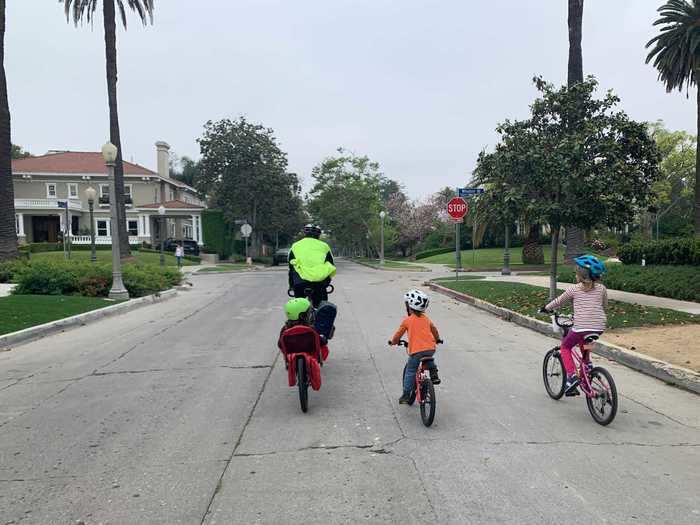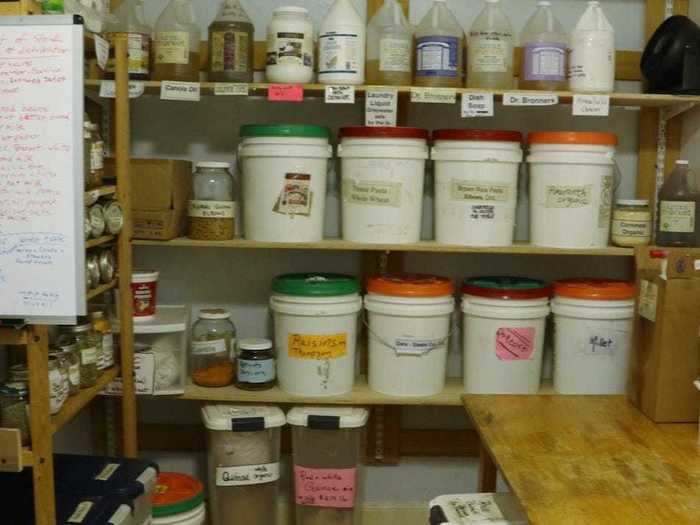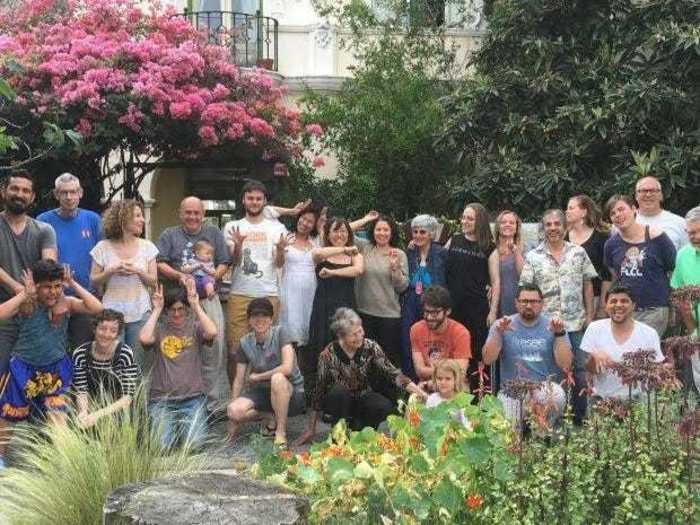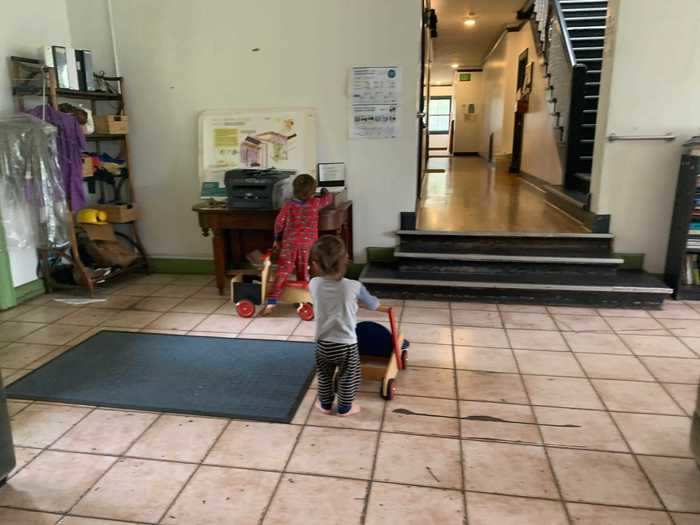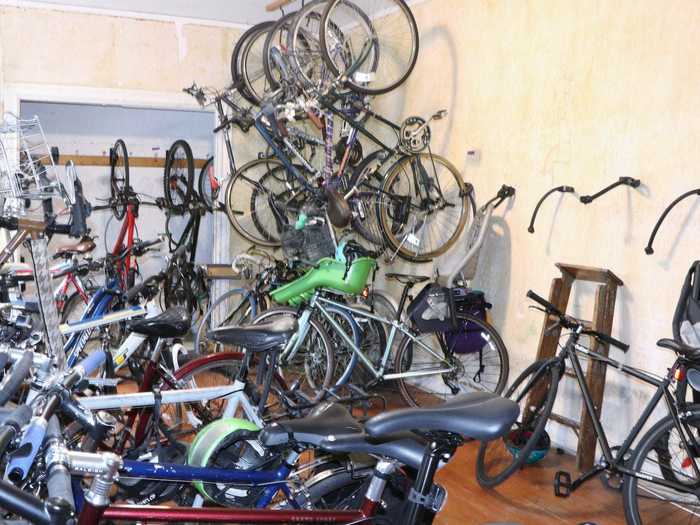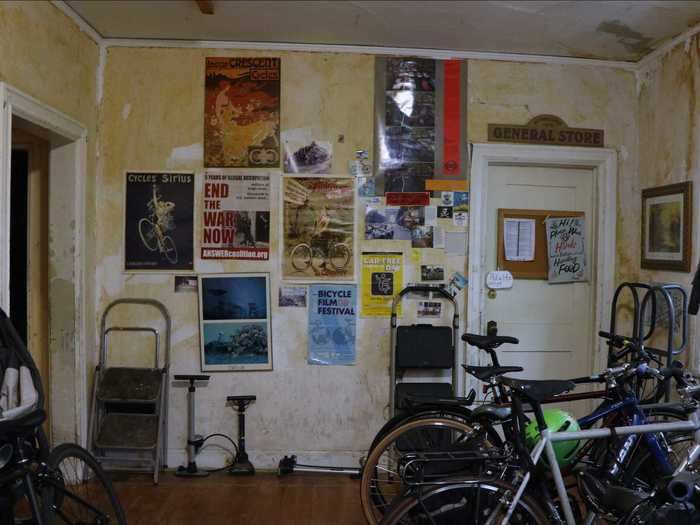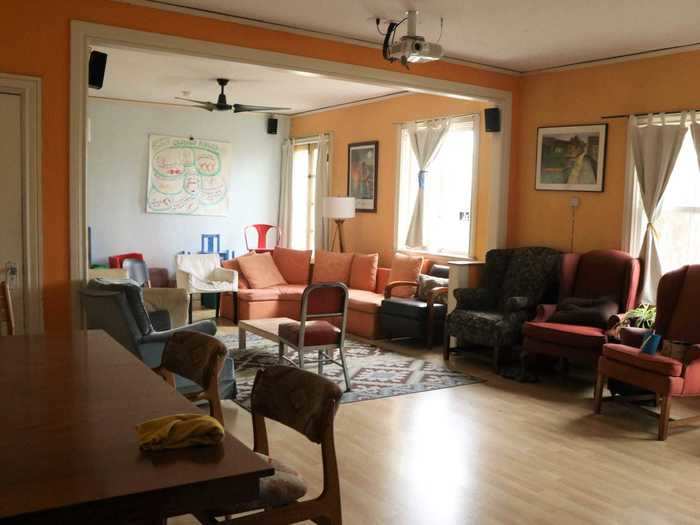Devon Fitzgerald is a five-year eco-village resident and the father of two young boys.Jessica Ruvalcaba
- Devon Fitzgerald lives with his fiance, Jessica Ruvalcaba, and their two children in the Los Angeles Eco-Village.
- They moved there five years ago because it was affordable and came with neighbors who shared their ideals of community-based living and biking culture.
- With COVID-19 stay-at-home orders in place, the residents' many potluck dinners are on hold, but they're having concerts in the courtyard where people stay far apart.
- "Emotionally, we do stuff for each other," said Fitzgerald.
- Visit Business Insider's homepage for more stories.
Devon Fitzgerald, a 30-year-old facial massage therapist living in a one bedroom apartment in Los Angeles with his fiancé, needed a change.
With 2015 set to usher in a marriage and a baby, he and his soon-to-be wife, Jessica Ruvalcaba, a future Waldorf School teacher, agreed that they weren't in search of a new apartment. What they needed was a community. The couple hoped to find an affordable space for their growing family that came with neighbors who shared their ideals of community-based living — and if a love of biking culture factored in, even better.
Enter the Los Angeles Eco-Village; an intentional community located near North Wilshire in the heart of Koreatown. The couple heard rumors about a communal courtyard with gardens, greywater washing machines (in which the water used to wash clothes is recycled to irrigate plants), and designated bulk food rooms, which all helped seal the deal.
Read the original article on
Business Insider
For a community that contains essential workers, families and some who are immunocompromised, how are these ideals and practices upheld?
The family has a daily ritual: A bike ride around LA, where streets are empty.
Jessica Ruvalcaba
"There are people who are sad because they are not being physically held, but emotionally we do stuff for each other. We have concerts in the courtyard where everyone who participates is far apart."
"We have a daily ritual with another neighbor with a young child," Jessica said. "We go on a bike ride. Our four year old, Eli, who just started riding his bike in Feb is now riding nine miles a day on the streets in Los Angeles. It may never happen again... Eli doesn't realize how special it is but Maeve, the older girl, is going to remember that time she could safely ride on the streets in LA."
Devon remembers when his children were born and how the community reacted. "[This] is a place where people want to support each other and take action. People brought us food, did our laundry, cleaned our apartment for us just out of wanting to make our life easier."
When asked what living in a community means to them, Jessica said, "That no one feels alone."
The author of this piece, Alissa Fitzgerald, is Devon Fitzgerald's sister.
Like many low-income groups, the residents of the Eco-Village faced challenges with quarantines around COVID-19.
A pantry containing communal food.
Jessica Ruvalcaba
"No one here has been tested. We had one neighbor whose daughter had a cough and a mild fever a week before the shutdown. They all self-isolated for two weeks. They all had help with their food; someone would go shopping for them."
For a place that prides itself on community, what does that mean as stay-at-home orders continue?
"I started making face masks, which I've sold only to Eco-Villagers and it's been a source of income and way to help," said Jessica.
The Eco-Village normally hosts a rotating series of specialists like an ecological systems designer touting, "Heal the Soil; Heal the World," or an intro to amaranth sifting. Shared meals like veggie potlucks are another regular occurrence where attendees are gently, or not so gently, reminded to "P-L-E-A-S-E Help make this a zero-waste event: Bring your own eating ware. Minimize plastics."
In these times, all talks and potlucks are on hold.
That said, the Eco-Village also thrives as a strong social network that needs little excuse to throw a party.
Every birthday is an excuse to gather and celebrate.
Jessica Ruvalcaba
Since the inhabitants range from young professionals in their 20s and 30s to growing families and the occasional octogenarian, every birthday is an excuse to gather and celebrate.
With the continuing order throughout California to shelter in place, how does that feel as the member of an intentional community? "People [were already] observing a pretty high level of adherence to social distancing and looking for ways to minimize the impact of the virus. We have a messaging system so someone can ask for help with groceries or supplies or if they need a hospital run. There are a certain amount of cars, and someone will step up."
Los Angeles has seen many changes in the past few decades.
The couple's children in a common area.
Jessica Ruvalcaba
Booming DTLA's face lift in the form of highrise condos and business epicenters has lured inhabitants away from coastal Santa Monica and Malibu. In Koreatown, family owned Korean BBQ joints now have three hour waits and shiny Michelin stars. You're as likely to see a Tesla woosh through East LA as a city bus. The Eco-Village is a throwback to a bygone era, encompassing the ideals of the 1960s with the realities of the 2020s.
The community was founded by the Cooperative Resources and Services Project acting as a nonprofit 501.c.3 community development organization. Operating as the Los Angeles Eco-Village since 1993, its mission is clear: "Demonstrate processes for achieving lower environmental impacts while raising the quality of community life."
The push for public transportation and bike culture is strongly encouraged.
Residents who use bikes instead of cars pay less in rent.
Jessica Ruvalcaba
If residents ditch their cars, they are eligible for a monthly rent reduction.
Composed of three double-level apartment buildings with over 50 units including studio, one-bedroom, and two-bedroom apartments, each floor has an able-bodied resident who acts as caretaker. "We have people in their 80s here, so [other residents] will offer their services or their car, depending on what they can offer," Devon said.
Signs remind residents and guests to leave communal spaces tidy after use.
Communal spaces are found throughout the eco-village.
Jessica Ruvalcaba
Those spaces are filled with homemade stained-glass panels and hand-tiled curbs celebrating unity, hope, and — of course — bicycling.
Within a few months, they had applied, interviewed and were invited to live in two side-by-side studio apartments.
The family was looking for a better quality of life at a lower cost.
Jessica Ruvalcaba
"We were looking for a higher quality of life at a lower cost," said Devon, now a five-year Eco-Village resident and the father of two boys, ages 4 and 2. "We wanted to be around people who not just shared values, but wanted to share activities, food, and time with their neighbors. We wanted to be in a place where that was easy."
Rainfall-catching buckets ring the village's courtyard, where an alcove is outfitted with tables and chairs, a sink, and even a refrigerator for easy entertaining.

